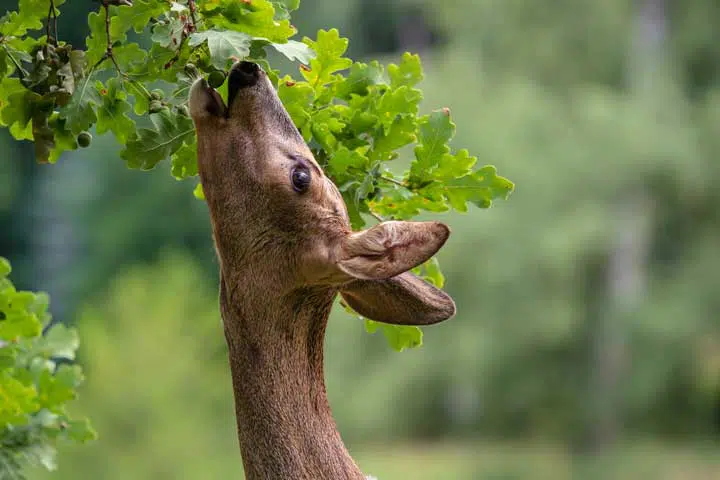If you’re curious as to what deer eat or use to supplement their diet, you may wonder, do deer like carrots? The answer is yes, they do like carrots, but it shouldn’t be a staple in their diet.
The diet of a deer varies throughout the year, primarily due to what is available as a natural food source for them. Different seasons require a deer to consume alternative amounts of food to keep healthy.
Do Deer Like Raw Carrots?
These wild animals prefer many assorted vegetables and fruits, including raw carrots. But even though they will eat carrots, apples, and other items, they should not be part of their natural diet. Hungry deer will dig through a garden to get to carrots. They will consume the carrot leaves as well as this root vegetable.
Carrots are like a treat for deer herds. It has some nutrients but not enough to sustain their activity level and protein requirements. If you introduce items like baby carrots in large amounts to a deer, it could spell disaster for them, resulting in a risk of death and affecting the deer population.
Can Deer Die From Eating Too Many Carrots?
Wild deer can suffer from acidosis from eating a large amount of supplemental food, like deer corn, in their natural habitat. This side effect is due to their digestive tract not successfully handling sudden changes in diet. They experience an upset stomach from a belly full of items they cannot digest properly and can eventually die.
Carrots are low in a supply of vitamins, proteins, and nutrients that deer need to survive. While it is a tasty treat for them, consuming too many edible vegetables like carrots can be harmful.
Just as a child shouldn’t always eat candy, deer shouldn’t eat a daily supply of carrots. So if you are wondering if whitetail deer eat carrots, the answer is yes, they do, but they should not eat a large amount.
What Do Deer Love to Eat the Most?
Deer are woody browse eaters and graze on various twigs, barks, leafy greens, weeds, and other vegetation native to the area. They love to consume various fruits and nuts, grasses, and mushrooms as their natural food supply. Acorns and other nuts are a favorite of wild deer.
Not only are they easy to find and consume, but they are also high in protein and nutrients, something they need as they build their fat reserves and replenish energy reserves. These elements are essential in various seasons.
When deer are growing their antlers or maturing, they seek out food sources rich in carbohydrates and are high-energy foods. Berries, and other fruits like apples and pears, are at risk for consumption in yards where deer frequent.

What Attracts Deer the Most?
Deer have an extremely keen sense of smell which helps them locate their favorite foods. Vegetation like clover is one of the best food sources for deer. Wild clover will grow in abundance in various locations. If you’d like to attract a deer for observation in the wild, you can purchase a clover deer attractant that will do the job.
Apple trees, an abundance of forbs, and grasses are all terrific food sources that will attract deer to a location in the winter months.
Is It Ok To Feed Wild Deer?
Though there are numerous products on the market today that are advertised as beneficial foods for deer, I highly advise against feeding wild animals.
When feeding wild deer, you could be doing more harm than good. They will come to rely on this food source, associating humans with food. Herds of deer have survived for centuries without any supplemental feeding, so they do not require additional food sources from you to live.
Do not feel that you have to feed wild deer because you see them foraging on your property during the cold season. They are hearty animals that are well equipped to find food sources throughout the year.
Not only could feeding wild animals bring harm to the animal, but it could bring harm to you as well. Some animals can become aggressive when in search of food. If they see you as a source of food and you don’t provide, you could be the victim of an unintentional attack. It’s best to observe animals from a distance and let them use their natural instincts for survival.
What If You Want to Repel Deer?
Since white-tailed deer are driven by their nose and not their sight, several deer-resistant plants will repel them from an area to keep them from getting into your abundant crop or vegetable garden. If you do not want these uninvited visitors to your property, you can try planting these aromatic plant choices:
These plants can be an attractive addition to your yard while acting as deer repellents and keeping any hungry herd of deer away from your vegetation.
Some other items you may consider planting in your garden to keep deer at bay are plants with a pungent scent, thorny vegetables, or prickly leaves. Plants like cucumbers, zucchini, or squash can aid in keeping the white-tailed deer population away.
Deer are very skittish to humans. If there is a lot of activity outdoors, they will avoid the area. If you don’t want deer around, try spending some time outside in your garden or doing yard work. They will keep away from the space as long as you are out there.
The Takeaway
Observing deer in the wild as they forage for food is a beautiful way to connect with nature. Deer instinctively know what foods can sustain their lifestyle, and they know where and how to find them. They don’t require the assistance of humans to survive in the wild.
Deer must maintain a balanced diet, and while deer eat carrots, it is not a staple food source. Natural vegetation such as leafy greens, weeds, and even wild berries are better options for deer to keep them thriving in their environment.




